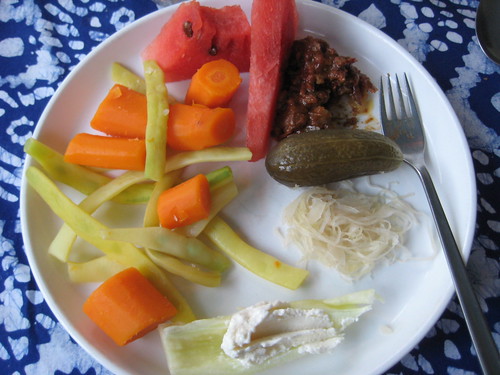Flickr Hungary photoset

With no MP3 player or radio along the soundtrack to our journey was the music coming from sources around us. An old accordion-player at a neighbour's house playing what sounded like strangely Mediterranean tunes. The house where The Doors was always played late at night. From the house attached to the doctor's office: hip-hop sampling M People's excellent version of Don't Look any Futher by Dennis Edwards. In Budapest: trendy but boring local acts like Yonderboi. At the weekly village market, surprising Manele.
But most of all, blasting out of cars everywhere: Bódi Guszti. Not only was his music heard all over the village and in deepest, most cosmopolitan Budapest, but it was what was immediately recommended to me by both the CD stalls at the market when I asked for interesting local pop music. So I gave in.

The music is best described, I guess, as gypsy disco - it's fairly broad european pop music with a distinct bent towards roma culture (with portions of songs in romani) and tacked on beats somewhere in the field between disco and trance/house/techno. Bodi Guszti is an artist, band leader, producer, impresario and label owner, and I've got two of his group-effort "Roma Sztárparádé" collections from which the following files are taken. Three are from the biggest hit album, Roma Sztárparádé 2, while the last is from the more techno-oriented and considerably less hit-filled Sztárparádé 3.
Bódi Guszti - Bulizz velünk (Zshare): Straightforward party tune (title means: "party with us") and probably the tune with the most recognisable "gypsy" flavour.
Notár Mary - Itt a piros hol a piros (Zshare): Mary is the young star (20 at the time of recording) of the Bódi family's stable. The title ("here's the red where's the red") refers to the classic street hustler game of "find the red card", similar to cup and ball. Here it's used as a metaphor for the singer's seductive powers, and it's interesting that the street hustler role which roma traditionally adopt is used as a positive marker.
Sárközy - Neked adom mindenem (Zshare): No, not the president of France, though maybe a relative. This one has a nice melody, a long romani section and a straightforward love message (title: "I give my everything to you").
Bódi Csaby - Ne Szeress (Zshare): This strangely soca-flavoured track by Guszti's son is highly moralistic, asking his beloved not to love him as she has cheated on him ("Don't love me/you gave someone else your heart finally/your soul/your body"). "Don't love me" is a great title I think.
 I'm trying to put together a set up to digitalise tracks off vinyl, and once I've got that going I'm going to upload a whole bunch of eighties tracks from Hungary that are probably more interesting than that lot. But I still think there's a certain quality to the Bódi Guszti stuff beyond the cheesy melodies and beats...
I'm trying to put together a set up to digitalise tracks off vinyl, and once I've got that going I'm going to upload a whole bunch of eighties tracks from Hungary that are probably more interesting than that lot. But I still think there's a certain quality to the Bódi Guszti stuff beyond the cheesy melodies and beats...










































4 comments:
Det är skumt att en hel del öst europa musik, bla från turkiet har nästan ett soca beat.
Lyssnade på turkisk radio i berlin som verkligen hade soca beat till många låtar. Hur kommer det sig?
Jag läste någon musikteoretiker som hävdade att många kulturer naturligt har hamnat i assymetriska rytmer (som 3+3+2) eftersom de matematiskt sett är det enklaste sättet att fördela ett ojämnt antal slag över ett jämnt antal pulsslag. Hur som helst är rytmerna vanliga i traditionell musik från Östeuropa, Mellanöstern och Afrika förutom Karibien.
Sen ska man nog inte underskatta raggans (numera också reggaetonens) influens på modern popmusik, inte minst i afrika och i Indien.
ja, den karibiska musikens rötter kommer ju från afrika och bortom.
Jag tror att allt eftersom musiken blir mer elektronisk i östeuropa mellanöstern så kommer den bli mer lik karibiska musiken eftersom de kommer mer stor säkerhet göra den i likande program och med likande mjukvarusyntar mm mm.
Soca är ju väldigt elektroniska musik egentligen, även om de flesta låtarna görs om till bandens live repotearer, fast då först i andra hand.
Absolut sant att hårdvaran/mjukvaran allt mer är den samma, men jag tror musikutbytet är större än man kanske tror också. Karibiens musik sprider sig till exempel via att invandrare från olika länder blandar sig, typ jamaikaner och indier i England och turkar och arubaner i Holland.
Post a Comment